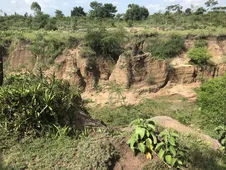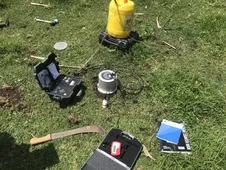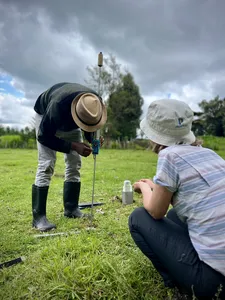Restoration of degraded tropical grasslands


Tropical grasslands are key ecosystems that sustain biodiversity, support local livelihoods, and play a crucial role in global climate regulation. In Kenya, these grasslands are fundamental to both communities and wildlife; however, overgrazing, agricultural expansion and climate change are leading to the degradation of these ecosystems, compromising their ecological integrity and reducing their ability to deliver essential ecosystem services. Degraded grasslands produce less biomass, tend to have less soil organic matter, and increase soil erosion rates, causing lower soil productivity and affecting biodiversity. Effective management and restoration of these degraded grasslands is vital to ensure their sustainability for future generations.
In collaboration with our partners – the International Livestock Institute (ILRI) in Kenya and Lancaster University in the UK, we conduct research in Western Kenya (smallholder farms) and South Kenya (Kapiti Ranch), employing a range of research methodologies, including in situ field surveys and controlled experiments, to identify effective restoration strategies by understanding intricate interactions between soil properties, grazing management on grassland productivity, and the resilience of grasslands to climate extremes such as drought and flood. This work will offer valuable insights into the current grassland soil health and inform restoration efforts that can enhance soil quality, promote species diversity, and restore ecosystem functionality. Each location, Western and Southern Kenya, has its own projects, which are described in more detail below.
Soil properties and grass functional groups focused on Western Kenya

This project will explore changes in soil physical properties that are important for soil health and the restoration potential of degraded grasslands. Specifically, we investigate changes in i) soil compaction using dynamic cone penetrometer to assess the extent of mechanical resistance in the soil profile, which may affect root growth and water movement, ii) aggregate stability to evaluate the soil’s ability to withstand various external disturbances and maintain structure under stress, iii) hydraulic conductivity to determine the capacity of the soil to transport water, a key factor that influences plant growth and surface runoff, and vi) evaluating soil conditions and species composition to determine how degradation relates to plant diversity.
Cattle grazing management focused on Kapiti Ranch
The project will investigate the influence of grazing management on soil health and plant species biodiversity, as well as the resilience of grasslands to extreme climate events such as drought and flooding.
Planned cattle grazing management will involve strategic livestock movement that considers time, intensity, duration, and frequency of grazing to allow optimal land use for the improvement of soil health and biodiversity. The study seeks to provide insights into the complex interactions between soil health indicators and grassland productivity. The main focus is on the effects of grazing on vegetation composition and soil quality. The research will employ a variety of methodologies, including soil analysis, vegetation assessments, controlled grazing, and grass drought experiments.
First, we will investigate the current state of degradation of the grassland using soil health indicators such as the physical, chemical, and biological properties. Secondly, the impact of grazing intensity on soil and plant community composition will be evaluated through grazing experiments. Lastly, we will examine the resilience of grasslands against climate stressors, such as drought and flood. Ultimately, the findings will contribute to the understanding of grasslands' ecological dynamics and help inform conservation efforts aimed at enhancing soil quality, promoting species diversity, and restoring ecosystem functionality in these grasslands.
Researchers
TUM: Habtamu Sibilu (PhD candidate), Rosemary Atieno Olang (PhD candidate), Prof. Dr. Mariana Rufino
Lancaster University: Prof. John Quinton
ILRI: Dr Sonja Leitner
MSc & BSc theses:
To be added